#pierre augereau
Text
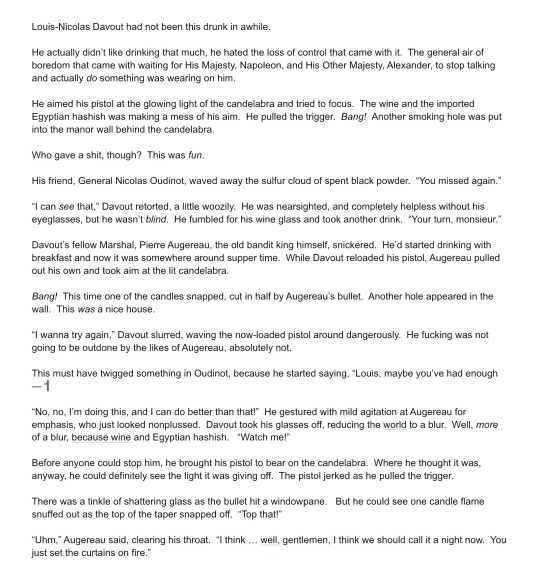
From today's Reddit challenge. Someone dared me with the prompt "Play stupid games, win stupid prizes," and I've been wanting to write my take on this since forever.
(First rough draft, written on the fly in 10 minutes, any mistakes are mine.)
#louis nicolas davout#nicolas oudinot#Pierre Augereau#napoleonic era#napoleonic shitpost#fan fiction#napoleon's marshals
18 notes
·
View notes
Text

Inspired by @microcosme11’s recent post. I feel like Augereau would actually find Lewis Goldsmith’s description of him in Secret History of the Cabinet of Bonaparte quite flattering, so here he is, proudly showing it off.
(The original painting of him pointing at his own portrait can be seen here.)
31 notes
·
View notes
Text

(過去絵) Born in the 1750s!
#歴史創作#napoleonic wars#my art#Louis-Alexandre Berthier#François Joseph Lefebvre#Pierre Augereau#André Masséna
9 notes
·
View notes
Text
Marshal Birthday Boys for October: In addition to Augereau's birthday on the 21 st, there is Grouchy's on the 23rd and Lefebvre's on the 25th.
Extra bragging rights to whoever can come up with anything about Grouchy, regarding whom not much seems to have been written - except perhaps some speculation relative to an inordinate fondness for strawberries.
5 notes
·
View notes
Text
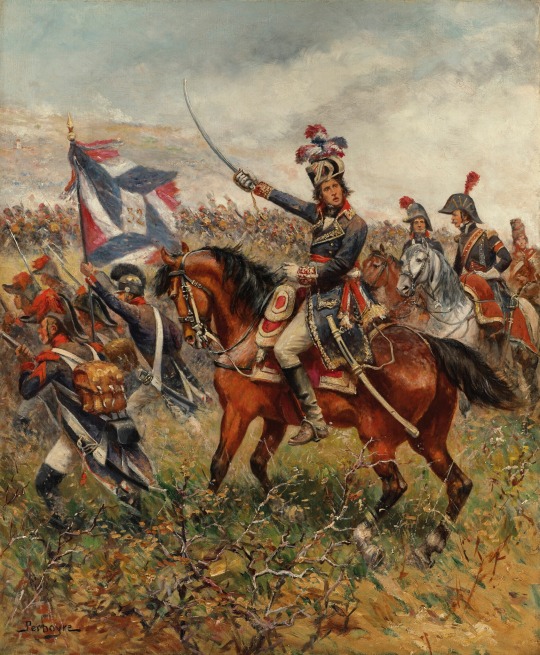
General Charles Pierre François Augereau at the Battle of Castiglione
by Paul Émile Léon Perboyre
#paul émile léon perboyre#charles pierre augereau#battle of castiglione#art#augereau#general#napoleonic#italian campaign#italy#france#french#french revolutionary wars#napoleonic wars#history#europe#european#italian#campaign#castiglione#campaigns#northern italy
99 notes
·
View notes
Text
Rumours about Augereau (1797)
And our witness is ... general Desaix, who by the end of July 1797 visited the army of Italy and went on a journey through Lombardy in order to report back to the Directory. This is taken from his "Journal de voyage", which seems to have been more of a notebook, where he jotted down first impressions that he felt he needed to remember.
That way, he gave brief descriptions of several of Bonaparte's generals. About Augereau, he has the following to say:
Augereau. Tall, handsome man, good figure, big nose, served in every country, soldier more or less, braggart a lot.
And some time later, he adds an ugly story he learned about him:
Fact about Augereau. In a town in Romagna,
he enters a pawnshop, fills his pockets with diamonds and precious objects, places a sentry there whom he has shot in cold blood because he has taken something.
He does not believe in probity or delicacy; he calls it foolish; he claims that it is useless and not to be found in the world.
35 notes
·
View notes
Text
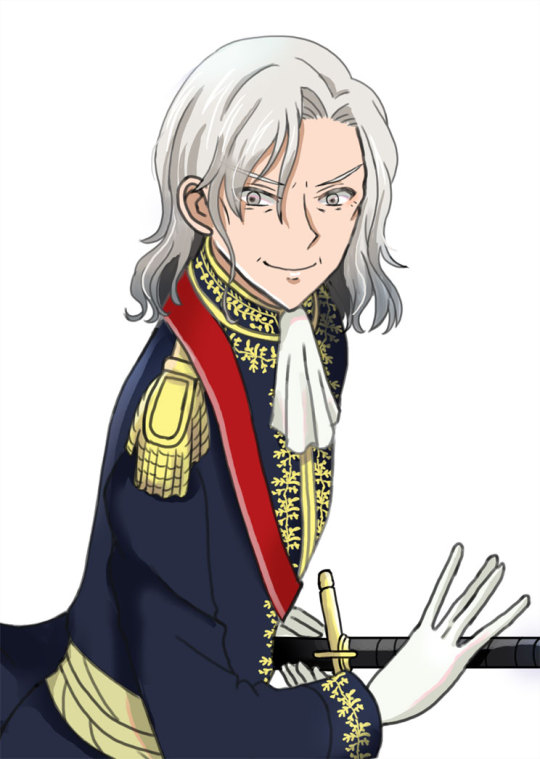
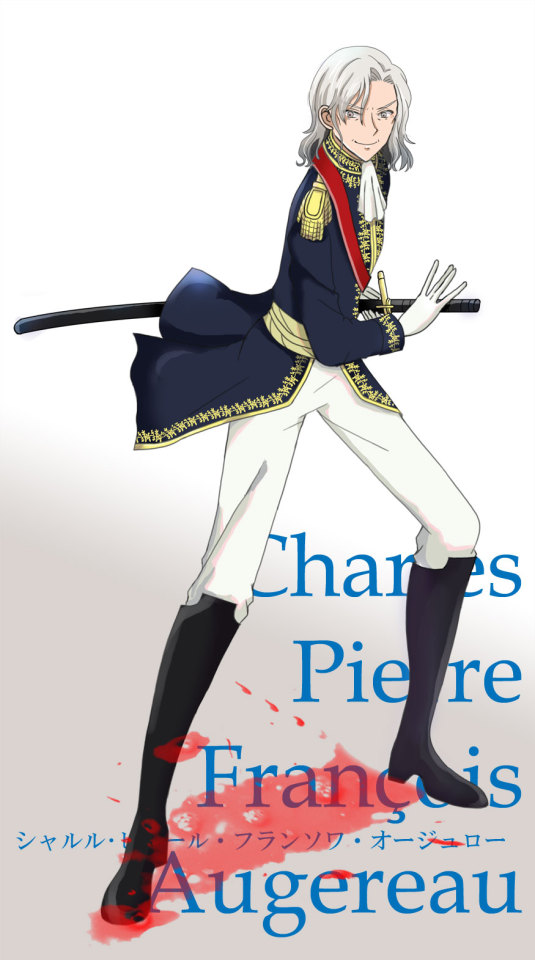
Marshal Augereau
Charles Pierre François Augereau
#marshal augereau#napoleonic era#history#charle pierre francois augereau#napoleons marshals#bonapartism#napoleonic wars#napoleonic
16 notes
·
View notes
Note
Oooh, tell me more about your headcanons for Augessena shipping!
Funnily enough: I actually don't know much about what Masséna and Augereau's relationship was like. A lot of my headcanons about them are purely headcanons, so do keep that in mind.
I'll just preface quickly with what I do know about their irl relationship: Masséna and Augereau met fairly early on around 1795, although Masséna had been in Italy for longer (since 1792). Masséna and Augereau seem to have been in friendly terms there, I'd say they seemed to be quite close joking around with each other and whatnot, if I remember correctly they would tease each other on quite a couple occasions, just 2 bastard besties ig. However from the end of the Italian campaign onwards their relationship seemed to be quite up and down, they'd "break up and get back together" quite frequently so to speak. Augereau would be the one usually starting these "conflicts" wherein they'd bicker at each other, sour their relationship, then get back on friendly terms again and I'm telling you this was like a very quick constant cycle for them they rlly were like an unstable divorced couple or smth 💀. I am not sure how Masséna viewed Augereau by the end of his life, but I know Augereau seemed to look back fondly on his relationship Masséna and have a somewhat high regard of him by the time he himself died.
Now for my headcanons, horray! I love them having this hot and cold relationship, very much "fuck you/ fuck me yourself coward" "you wanna make out with me so bad it makes you look stupid" kinda vibes. Definitely a very angsty relationship where neither of them wants to fully admit they're attracted to or care about each other and bicker with each other instead. I'd say they're relationship is 50% sex 25% "I care about you" 25% "kys". Fun fact: I know that while they were in Italy Augereau genuinely stressed out about Masséna's approach to things being very reckless/bombastic, not necessarily because of the approach itself but because Masséna was putting himself in danger. This makes me think that Augereau cares but he cares silently, not telling Masséna about it directly, while Masséna cares about Augereau and is also mostly silent about it but confesses it to him in times of great stress/danger/after major injuries. If I can think up of more headcanons that remind me of them I'll put them here but yeah, I am all alone in my big empty AugeSséna palace.

#andré masséna#charles pierre augereau#napoleon's marshals#napoleonic era#napoleonic#augesséna#they hate each other#but they love each other too#old men yaoi#they invented old men yaoi
12 notes
·
View notes
Text
Happy birthday Marshal Augereau! October 21, 1759

#marshal Augereau#charles-pierre augereau#happy birthday#napoleons marshals#on my list it said he was born in 1759 but on Wikipedia it said 1757?
15 notes
·
View notes
Text

Inspired by @histoireettralala's Incorrect Marshals Quotes Part 60.
I have no idea how to draw Augereau...
#napoleonic#napoleonic era#napoleonic wars#shitpost#*randomly flips through the Murat outfit compendium*#joachim murat#jean lannes#jozef poniatowski#Charles-Pierre Augereau
89 notes
·
View notes
Text
VOTE FOR A MARSHAL OF THE EMPIRE!!!
SINCE WERE NOT GOING TO APPEAR FOR AGES IN THAT OFFICIAL TOURNAMENT AND THE EMPEROR JUST GOT ROYALLED FUCKED THERE BY A VANISHED ROAST BEEF
HERES A BALLOT JUST FOR US MARSHALS OF THE EMPIRE!!
IN CASE YOU DONT KNOW WHO WE ARE WE'RE THE TOP MILITARY COMMANDERS PROMOTED BY NAPOLEON HIMSELF
AND WE HAVE REALLY BIG HATS
VOTE FOR WHOEEVER THE FUCK YOU WANT WHETHER THATS THE BEST OR THE SEXIEST OR THE MOST PATHETIC I DONT CARE
YOU KNOW YOU WANT TO VOTE FOR ME THOUGH!!!
GO AHEAD AND POST ALL THE PROPAGRANDA YOU WANT, THE ADC WILL SHARE IT IF ITS FUNNY
SORRY TO MONCEY, JOURDAN, BERNADOTTE, BRUNE, MORTIER, KELLERMAN, PERIGNON, SERURIER, VICTOR, MACDONALD, OUDINOT, MARMONT, SUCHET, SAINT-CYR AND GROUCHY, MAYBE WELL HAVE A PITY POLLE LATER
84 notes
·
View notes
Text

Everyone else is sharing their writing today, so have a snippet of something I’m working on. 👋
13 notes
·
View notes
Text
Tag Yourself: Unabridged Shitty Drawing Marshal of the Empire Edition
Yes All 26 Of Them + Bonus 2
drawn and compiled by yours truly, initial and probably inaccurate research assisted by Chet Jean-Paul Tee, additional research from Napoleon and his Marshals by A G MacDonnell, Swords Around A Throne by John R Elting and a bunch of other books and Wikipedia pages
captions under images




mike (Michel Ney)
- full of every emotion
- always has ur back
joe (Joachim Murat)
- it's called fashion sweetheart
- will not stop flirting
lens (Jean Lannes)
- bestie who will call u out on ur shit
- does not like their photo taken
bessie (Jean-Baptiste Bessieres)
- actually nice under the ice
- was born in the wrong generation
dave (Louis-Nicolas Davout)
- overachiever
- 20 year old boomer
salt (Jean-de-Dieu Soult)
- people think ur up to no good
- doesn’t cope with sudden changes 2 plans
andrew (Andre Massena)
- actually up to no good
- sleepy until special interest is activated
bertie (Louis-Alexandre Berthier)
- carries the group project
- voted most likely to make a stalker shrine
auggie (Pierre Augereau)
- shady past full of batshit stories
- will not stop swearing in the christian minecraft server
lefrank (François Joseph Lefebvre)
- dad friend
- in my day we walked to school uphill both ways
big mac (Étienne Macdonald)
- brutally honest
- won't let you borrow their charger even if they have 100%
gill (Guillaume Brune)
- love-hate relationship with group chats
- pretends not to care, checks social media every 2 minutes
ouchie (Nicholas Oudinot)
- needs to buy bandages in bulk
- a little aggro
pony (Józef Antoni Poniatowski)
- can't swim
- tries 2 hard to fit in, everyone secretly loves them anyway
grumpy (Emmanuel de Grouchy)
- can't find them when u need them
- complains about the music, never suggests alternatives
bernie (Jean-Baptiste Bernadotte)
- always talks about their other friendship group
- most successful, nobody knows how
monty (Auguste de Marmont)
- does not save u a seat
- causes drama and then lurks in the background
monch (Bon-Adrien Jeannot de Moncey)
- last to leave the party
- dependable
morty (Édouard Mortier)
- everyone looks up 2 them literally and figuratively
- golden retriever friend
jordan (Jean-Baptiste Jourdan)
- volunteers other people for things
- has 20+ alarms but still oversleeps
kelly (François Christophe de Kellermann)
- old as balls but still got it
- waiting in the wings
gov (Laurent de Gouvion Saint-Cyr)
- infuriatingly modest about their art skills
- thinks too much before they speak
perry (Catherine-Dominique de Pérignon)
- low-key rich, only buys things on sale
- “let’s order pizza” solution to everything
sachet (Louis-Gabriel Suchet)
- dependable friend who always brings snacks
- lowkey keeps the group together
cereal (Jean-Mathieu-Philibert Sérurier)
- unnervingly methodical and precise about fun
- will delete your social media after u die
vic (Claude Victor-Perrin)
- loves spicy food but can’t handle it
- says they're fine, not actually fine
Bonus!
june (Jean Andoche Junot)
- chaotic disaster bisexual
- will kill a man 4 their bestie
the rock (Géraud Duroc)
- keeps a tidy house
- mom friend with snacks
#napoleon’s marshals#napoleonic era#napoleonic shitposting#napoleonic wars#history shitposting#cadmus draws#I thought it would be funny if it was hand drawn#i had to draw these over a few weeks or else my RSI ridden fingers would explode#I will reblog this a few times because this is so stupid and I’m proud of this#yes chatgpt helped because I’m not actually familiar with most of the 26#ended up editing a lot of it but some entries are less based on history and more based on vibes#and as we know vibes are extremely accurate
133 notes
·
View notes
Text
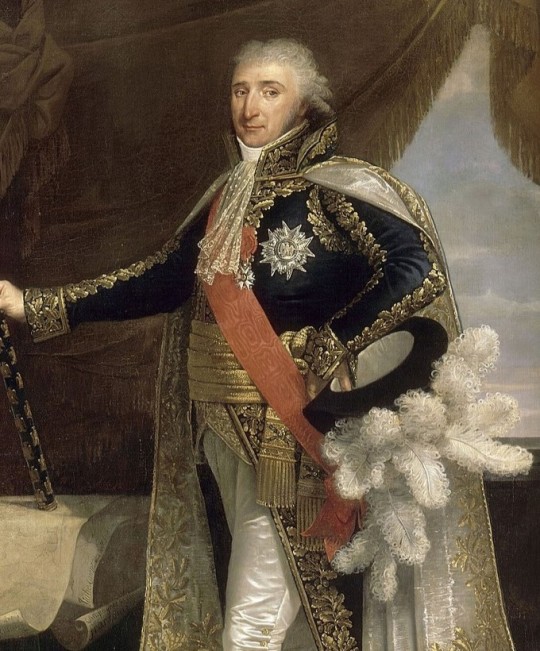

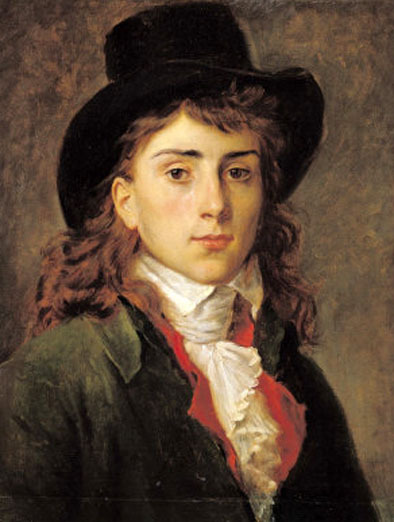
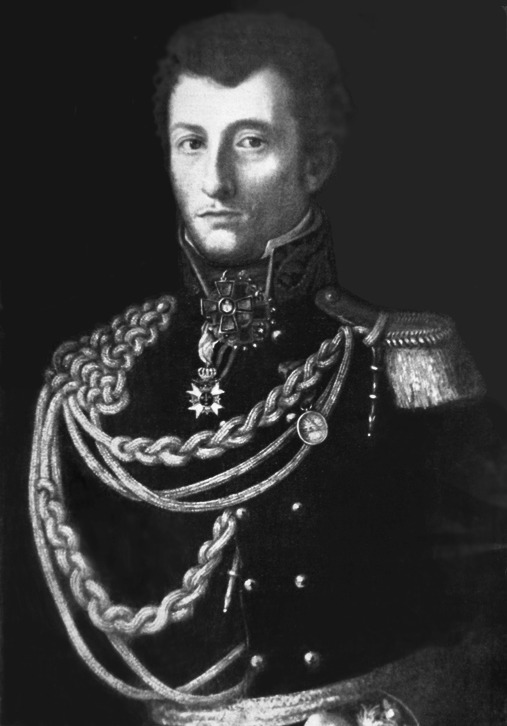

*aka "who are you most shocked/surprised/upset/aghast that we lost in the first round?"
Propaganda for Each:
Augereau:
“dude’s backstory is a fucking dungeons and dragons adventurer backstory, duellist who had to flee France after killing an officer, adventurered in Prussia and Russia and duelled and fought, also cannot physically stop swearing, what a man”
“Man of many talents even before the Revolution: noted swordsman and duellist, so talented that he accidentally killed a superior officer. Joined armies all over Europe, then taught fencing and dancing after he settled. Eloped with his first wife, whom he loved and respected. Partly responsible for victories at Castiglione and Arcole during the Italian campaign. Tied himself to a horse to lead his corps on Eylau (very metal). Has a very cool portrait where he points at a portrait of himself at Arcole
Gogol:
[no propaganda submitted]
Gros:
One of Napoleon’s main painters. Pioneer of French Romanticism. Inspired many artists such as Delacroix and Géricault. He was very pretty.”
Clausewitz:
"what could possibly be sexier than a prussian uniform and a lasting impact on military theory?”
Czartoryski:
"Decided that the way to free Poland was by having a threesome with Alexander and his wife.”
#napoleonic sexyman tournament#naps ironically lost by more than a percent#although coming back to win a redemption poll was so on brand for him that I almost tweaked the rules for it
45 notes
·
View notes
Text
Ney’s Execution; Victor’s Remorse
If, in the year of 1815, all eyes are turned to Luxembourg, it is not to admire the Haute Chambre itself, but because a resounding event took place there: Ney first appeared before a council of war that declared itself incompetent; according to his own wishes, he is brought before the Chamber of Peers constituting a Court of Justice. A climate of revenge permeates royalist circles, excepting the King, a fine politician, who would have done without a lynching. His entourage, however, burns to make an example, a sort of expiatory sacrifice.
On 4 December [1815], the Peers meet and debate for two days. The result is without appeal: one single Peer, the duke of Broglie, speaks with courage against the condemnation; five abstain; seventeen vote for deportation; a hundred and thirty eight vote for death. They considered themselves judges rather than jurors; they thus enforced the law. Victor voted with the majority, undoubtedly with a heavy heart; in any case in each of the two ballots, he voted for the death of his former companion-in-arms, as did Maison, former chief of staff of Victor and Ney’s companion-in-suffering in Russia. The King will not use his right of pardon and Ney will be shot on 7 December.
It seems that Victor, throughout his life, will suffer from remorse of this decision [...]
Jean-Pierre Tarin, Le Maréchal Victor: loyal sous Napoléon, fidèle sous la Restauration, p. 280.
It is common knowledge in Napoleonic circles that Victor voted for Ney’s death, and the circulated claim that Victor regretted his choice for the rest of his life intrigued me as soon as I saw it. From where was it sourced and how valid was the source? The Tarin biography of Victor skims over Victor’s reaction to Ney’s fate (more emphasis was given to figures of the Restoration in the succeeding passages—men, money, dates). Worse, the account Tarin gives of the trial and execution does not seem to be sourced, as if a memory-based anecdote. Evidently, from Tarin’s perspective, Victor’s alleged “remorse” is unimportant to his life. I am sure many reading this would agree with Tarin—it would be more telling to act as one believes in the moment than to cry over spilt milk. Indeed, acting in the moment is what the Marshals are known for, and it's why We Don't Talk About Victor Marshals that fit the archetype are more likeable.
The Le Coustumier biography is sympathetic to Victor. It circulates the same claim with more detail, and fortunately, the source is mentioned (p. 284).
If we are to believe Count André Martinet in an article published in Janurary 1902 in Le Figaro, (as Martinet could consult the Bellune family archives and speak with [Victor’s] descendants,) the death of Ney tormented Victor’s conscience through his remaining life. He reports: “But there was a day in the year where the Duke of Bellune did not appear at the family table, where he refused to receive even the most intimate of his friends: 7 December, which witnessed Ney's execution.* (…) Why, he often said, did my poor comrade refuse to appear before a council of war composed of the Marshals of France? If we were obliged to pronounce a condemnation, rather than executing the sentence, we would all have returned our batons to the hands of the King, and he would have been compelled to give pardon.”
* The death of Ney pursued Victor to his grave. It was the 7 and 8 March 1841 that the eldest son of the Prince of Moscow made his entrance after ten years of waiting into the Chamber of Peers, demanding in vain the rehabilitation of his father. On both days, Victor was resting at Saint Louis des Invalides, to be buried on 9 March at Père Lachaise.
A note on the footnotes: Victor had died on 1 March 1841, so Le Coustumier may be stretching the metaphor a little. It might be more logical to say that Marshal Ney was left unrecognised until more favourable hands seized political power. The italics are my emphasis, for clarity. pp. 280-281 of the Le Coustumier quotes Augereau (unsourced!) on a similar note.
Weakened by his remorse, Augereau confessed on his deathbed, seven months later: “We were cowards. We should have declared ourselves competent despite Ney’s objections. If we had done so, he would at least have lived."
Augereau's words are believable enough. Do we buy Victor’s “remorse”?
The source from which the claim is taken from should not be disregarded entirely—Le Figaro is still recognised as an authoritative and independent newspaper—but it does have conservative tendencies, and has largely catered to a middle, if not the upper-middle class. To put it in context, the author of the article was a count, writing about a former government official with a similar status to himself, and conducted interviews with said official’s descendants. As a result of the individuals involved and the demographic the newspaper caters to (one similar to the featured individual), the writer would be more likely to portray Victor in a positive light. If remorse does not exonerate Victor, it softens his cruelties and paints his decision as a one-off mistake instead of condemning his character flaws. Is repenting for twenty-six years not absolution enough? Is it not karmic enough that Ney’s death occurred on Victor’s birthday, permanently blackening a date supposed to be his? (Never mind that perhaps he celebrated his name day or baptism day instead of his birthday, or that one day of mourning each year is a small price to pay for a dead man.) But if, as humans, we want to believe in the inherent goodness in Victor, we must also consider the claim's side affect of apotheosising the man. This is, after all, a family account featured in a sympathetic newspaper.
If there were other sources to crosscheck this, we could verify Victor’s sentiments (and if they are true, calling your annual day to wither away in a room “remorse” may be underselling how much you regret your life choices). The problem is that I cannot find other sources. It would be gratifying to believe Victor’s grief was real, because he was only human, but it is dubious at best. One can only hope that, in some timeline, if not in this one, he did pay emotional penance. Ultimately, I think that if a claim is made, it will be remembered if it is a good story.
#michel ney#claude victor-perrin#le maréchal victor: loyal sous napoléon fidèle sous le restauration (2006)#le maréchal victor (2004)#this is late but maybe it is better that way#we don't talk about victor but maybe for good reason#the next bits of the biographies will probably be in chronological order
41 notes
·
View notes
Text
The Battle of Ulm on 16th – 19th October, 1805 was a series of skirmishes, at the end of the Ulm Campaign, which allowed Napoleon I to trap an entire Austrian army under the command of Karl Freiherr Mack von Leiberich with minimal losses and to force its surrender near Ulm in the Electorate of Bavaria.
In 1805, the United Kingdom, the Austrian Empire, Sweden, and the Russian Empire formed the Third Coalition to overthrow the French Empire. When Bavaria sided with Napoleon, the Austrians, 72,000 strong under Mack, prematurely invaded while the Russians were still marching through Poland.
Napoleon had 177,000 troops of the Grande Armée at Boulogne, ready to invade England.
They marched south on 27th August and by 24th September were ready to cross the Rhine from Mannheim to Strasbourg. After crossing the Rhine, the greater part of the French army made a gigantic right wheel so that its corps reached the Danube simultaneously, facing south.
On 7th October, Mack learned that Napoleon planned to cross the Danube and march around his right flank so as to cut him off from the Russians who were marching via Vienna. He accordingly changed front, placing his left at Ulm and his right at Rain, but the French went on and crossed the Danube at Neuburg, Donauwörth, and Ingolstadt.
Unable to stop the French avalanche, Michael von Kienmayer's Austrian corps abandoned its positions along the river and fled to Munich.
On 8th October, Franz Auffenberg's division was cut to pieces by Joachim Murat's Cavalry Corps and Jean Lannes' V Corps at the Battle of Wertingen.
The following day, Mack attempted to cross the Danube and move north. He was defeated in the Battle of Günzburg by Jean-Pierre Firmin Malher's division of Michel Ney's VI Corps which was still operating on the north bank.
During the action, the French seized a bridgehead on the south bank. After first withdrawing to Ulm, Mack tried to break out to the north. His army was blocked by Pierre Dupont de l'Etang's VI Corps division and some cavalry in the Battle of Haslach-Jungingen on 11th October.
By the 11th, Napoleon's corps were spread out in a wide net to snare Mack's army. Nicolas Soult's IV Corps reached Landsberg am Lech and turned east to cut off Mack from Tyrol.
Jean-Baptiste Bernadotte's I Corps and Louis Nicolas Davout's III Corps converged on Munich. Auguste Marmont's II Corps was at Augsburg. Murat, Ney, Lannes, and the Imperial Guard began closing in on Ulm. Mack ordered the corps of Franz von Werneck to march northeast, while Johann Sigismund Riesch covered its right flank at Elchingen. The Austrian commander sent Franz Jellacic's corps south toward Tyrol and held the remainder of his army at Ulm.
On 14th October, Ney crushed Riesch's small corps at the Battle of Elchingen and chased its survivors back into Ulm. Murat detected Werneck's force and raced in pursuit with his cavalry. Over the next few days, Werneck's corps was overwhelmed in a series of actions at Langenau, Herbrechtingen, Nördlingen, and Neresheim. On 18th October, he surrendered the remainder of his troops. Only Archduke Ferdinand Karl Joseph of Austria-Este and a few other generals escaped to Bohemia with about 1,200 cavalry.
Meanwhile, Soult secured the surrender of 4,600 Austrians at Memmingen and swung north to box in Mack from the south. Jellacic slipped past Soult and escaped to the south only to be hunted down and captured in the Capitulation of Dornbirn in mid-November by Pierre Augereau's late-arriving VII Corps. By 16th October, Napoleon had surrounded Mack's entire army at Ulm, and four days later Mack surrendered with 25,000 men, 18 generals, 65 guns, and 40 standards.
Some 20,000 escaped, 10,000 were killed or wounded, and the rest made prisoner.
About 500 French were killed and 1,000 wounded, a low number for such a decisive battle.
In less than 15 days the Grande Armée neutralized 60,000 Austrians and 30 generals. At the surrender (known as the Convention of Ulm), Mack offered his sword and presented himself to Napoleon as "the unfortunate General Mack". Mack was court-martialed and sentenced to two years' imprisonment.
(Information From Wikipedia)

0 notes